Dartmouth's Admissions Dean on the Return to Testing
Admissions dean Lee Coffin spoke with Inside Higher Ed about the data behind Dartmouth's decision to reinstate standardized testing, and more. Read the full interview here.
Admissions dean Lee Coffin spoke with Inside Higher Ed about the data behind Dartmouth's decision to reinstate standardized testing, and more. Read the full interview here.
Students think of a "Dean" as a signature on a letter, someone like the Wizard of Oz: an idea more than a person. I'm emerging from behind my proverbial curtain to share insights informed by my actual experience: I was a first-generation college student, and need-based financial aid opened my door to opportunity. Not many students from my large high school went on to selective colleges, so advice was thin. I was largely on my own. My platform here helps me reach those of you in a similar place.
— Lee Coffin, Vice President and Dean of Admissions and Financial Aid
5 FEBRUARY 2024
6 JULY 2023
12 JANUARY 2022
For centuries, the liberal arts have been foundational to the mission of higher education. But trying to explain the concept of this course of study — and the multifaceted roadmap a liberal arts degree provides for one's life and work in the 2020s and beyond—can be challenging. And so AB host Lee Coffin called in a specialist: Cecilia Gaposchkin, a Dartmouth history professor whose courses range from the fall of Rome to the Crusades to the medieval kings of France. She was also the College's longtime dean for pre-major advising. But the subject matter of the liberal arts—chemistry or history, philosophy or French—is often less important than the skills a student learns: how to think critically, pose tough questions, write clearly and persuasively, and be a productive citizen. "A liberal arts degree is a degree in thinking," Professor Gaposchkin advises high school seniors and juniors as they consider their options.
A transcript is available for this episode.
Subscribe wherever you listen to podcasts:

Vice Provost for Enrollment and Dean of Admissions and Financial Aid Lee Coffin welcomes the 1,126 members of the Class of 2026 and gives a statistical breakdown about the class.
Vice Provost for Enrollment and Dean of Admissions and Financial Aid Lee Coffin welcomes the 1,126 members of the Class of 2026 and gives a statistical breakdown about the class.
Lee Coffin, Vice Provost for Enrollment and Dean of Admissions and Financial Aid, joins President Philip J. Hanlon ’77 and other campus leaders as they announce a historic new development in Dartmouth's mission to create a global educational experience enriched by geographic and socio-economic diversity.
Lee Coffin, Vice Provost for Enrollment and Dean of Admissions and Financial Aid, joins President Philip J. Hanlon ’77 and other campus leaders as they announce a historic new development in Dartmouth's mission to create a global educational experience enriched by geographic and socio-economic diversity.
Ranvir R. Deshmukh '26 recreated the 8-year-old music video of Happy - By Pharrell Williams produced by Jake Gaba '16 and Yesuto Shaw '15 and directed by Jeremy Thibodeau '14 in 2014. The 2023 version includes videography by Dhanush Balaji '26, drone footage by Nikky Lewis '26, and was produced, directed, and edited by Ranvir R. Deshmukh '26
Ranvir R. Deshmukh '26 recreated the 8-year-old music video of Happy - By Pharrell Williams produced by Jake Gaba '16 and Yesuto Shaw '15 and directed by Jeremy Thibodeau '14 in 2014. The 2023 version includes videography by Dhanush Balaji '26, drone footage by Nikky Lewis '26, and was produced, directed, and edited by Ranvir R. Deshmukh '26
In each issue of 3D, Dartmouth's undergraduate admissions magazine that celebrates our vibrant community framed by nature, Dean Coffin shares advice and insights on the admissions process.
Read 3D Magazine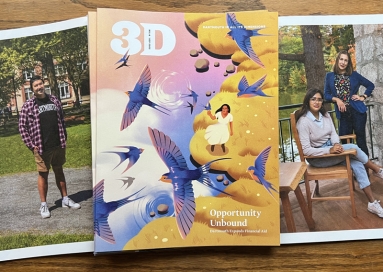
"The academic program, the people, the place at a college or university must each align with your persona, aspirations, and values."
Read More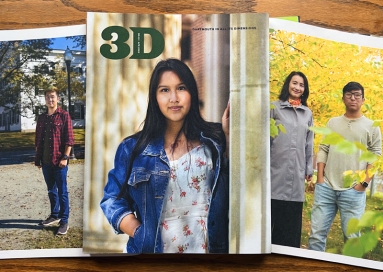
“Dartmouth expanded its longstanding need-blind admissions policy to include all international citizens.”
Read More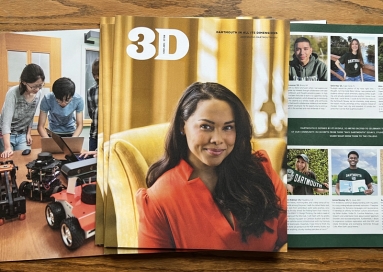
You control the opportunity to introduce yourself, to tell your story in whatever way feels right to you.
Read More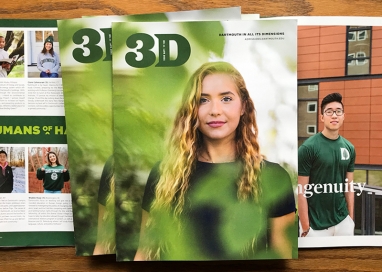
"Whether you are a junior or a senior, 3D can help you answer the question."
Read More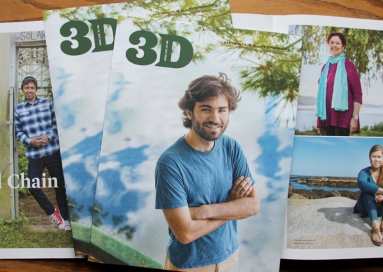
"Give yourself permission to explore, even when some voices around you are less convinced."
Read More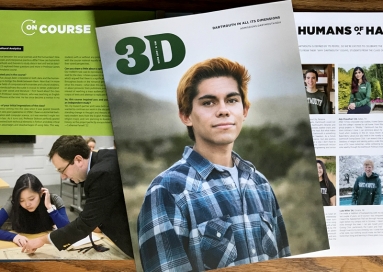
"Unmute yourself! Tell us your story. Your essay and recommendations and interviews offer opportunities to do just that."
Read More